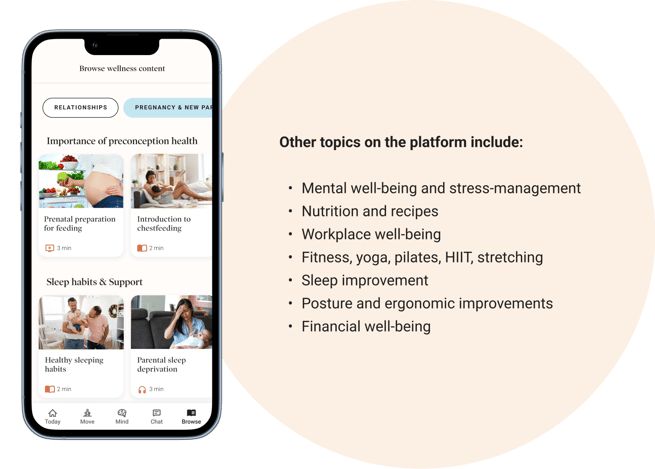Trying to adopt a new habit or make a healthy lifestyle change is hard. For example, one study reported that 77% of people can make a desired change for a week. However, when it comes to holding onto a new habit for two years, only 19% manage to do so.
It’s normal to struggle to change our routines or stay motivated. We’re not designed to change behaviours overnight, and often we trend towards actions and habits that are comfortable and familiar.
However, employees often want to change their lifestyle to improve well-being. How can employers and HR leaders help team members break out of old patterns, and adopt new habits that will actually stick?
According to behavioural psychology, behaviour change is more likely to be successful if individuals stick to small habits over time rather than striving for an ultimate end goal or outcome. For example, if the desired outcome is to improve nutrition, the end goal shouldn’t be a number on the scale or the number of calories consumed per day.
Instead, the desired outcome should be how closely one sticks to a system that promotes sustainable behaviour change for life, such as preparing healthy meals or eating with friends and family more often. This way, efforts don’t regress once the ultimate goal or end outcome is achieved.
In this article, we break down the steps for how HR and business leaders can support their employees to adopt a sustainable system to help them improve their lifestyle with Dialogue’s Wellness program.
Help employees understand what areas of their lifestyle they can tackle to improve their well-being.
There are several determinants of well-being that shape how an employee shows up for work and for life. While some employees may know which areas need improvement, others may not be aware of the impact of lifestyle behaviours.

To identify areas for lifestyle improvement, encourage your employees to take their Well-Being Score in the Dialogue app. Based on questions developed and validated with the World Health Organization, the 1-minute survey will recommend personalized steps to improve well-being, and programs and services eligible for your employees.
From an organizational perspective, measuring aggregated Well-Being Scores helps you understand areas where employees may need more support. Data from this assessment may also guide company-level conversations on the root-causes of disability, turnover, absenteeism, and talent attraction.
Get inspired with evidence-based resources on health and well-being.
With unlimited free information on the internet, it can be overwhelming to sort fact from fiction. Instead, employees can consult evidence-based resources through Dialogue’s Wellness program. Learning from evidence-based resources means that experts have consulted clinical guidelines and the latest scientific research to make recommendations that actually work.
Wellness content is created in collaboration with our in-house clinical team, including physicians, psychologists, dietitians, kinesiologists, nurse practitioners, and more. We carefully select external partnerships based on their clinical expertise and adherence to evidence-based guidelines. For example, Dialogue recently partnered with Koble, a Canadian company dedicated to supporting parents and new families across the entire perinatal journey – from family planning all the way to recovery and return to work.

Encourage employees to adopt and track 1-3 micro changes personalized to their well-being goals.
We’re often tempted to do it all at once – run a 10k, get 8 hours of sleep every night, or prepare home-cooked meals daily. Based on the principles of behavioural science, individuals are more likely to achieve their goals if they are detached from the end outcome. To help them succeed, empower employees to adopt daily habits or micro changes that will accumulate over time to help them reach their overall well-being goal.
With Wellness, employees may select from several micro changes in our Healthy Habit collections. These healthy habits are clinically validated, which means that if adhered to overtime, they will accumulate into achieving a larger well-being goal.

Take advantage of the workplace environment.
The workplace environment plays an important role in shaping employee habits. Whether in the office or working remotely, try encouraging employees to structure their environment to make healthy habits easier to accomplish. This is known as choice architecture.
Some examples of healthy choice architecture can be:
- Stocking healthy snacks and fresh fruit available
- Ordering nutritious team meals or catering
- Encouraging “walking” meetings with colleagues
- Company-wide “focus” or “well-being time” blocked in the calendar
Creating an environment that is conducive to healthy choices increases the chances of automaticity – or reaching the point when a new behaviour or habit becomes automatic.
Make healthy lifestyles more affordable by leveraging employer-sponsored benefits.
With rising inflation and the cost of living crisis, finances can sometimes be a barrier to adopting a healthier lifestyle. Employers who choose Dialogue’s Wellness program help employees access meditations, well-being content, habit tracking, and workouts for free – employees never need to pay out-of-pocket for separate subscription services. This takes away the burden of worrying about your well-being, allowing employees to fully concentrate on feeling happier, healthier, and more productive.
Discover other tools to manage your mental health and well-being.




 Canada (EN)
Canada (EN)
 Global (EN)
Global (EN)








